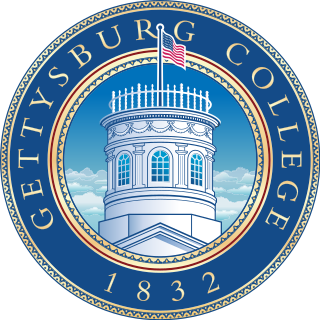Related Research Articles

The Gettysburg Address is a speech that U.S. President Abraham Lincoln delivered during the American Civil War at the dedication of the Soldiers' National Cemetery, now known as Gettysburg National Cemetery, in Gettysburg, Pennsylvania on the afternoon of November 19, 1863, four and a half months after the Union armies defeated Confederate forces in the Battle of Gettysburg, the Civil War's deadliest battle. It remains one of the best known speeches in American history.

Memorial Day is a federal holiday in the United States for honoring and mourning the U.S. military personnel who died while serving in the United States Armed Forces. From 1868 to 1970, it was observed on May 30. Since 1970, it is observed on the last Monday of May.

"In the Mood" is a popular big band-era jazz standard recorded by American bandleader Glenn Miller. "In the Mood" is based on the composition "Tar Paper Stomp" by Wingy Manone. The first recording under the name "In the Mood" was released by Edgar Hayes & His Orchestra in 1938.

David Daniel Rose was a British-born American songwriter, composer, arranger, pianist, and orchestra leader. His best known compositions were "The Stripper", "Holiday for Strings", and "Calypso Melody". He also wrote music for many television series, including It's a Great Life, The Tony Martin Show, Little House on the Prairie, Highway to Heaven, Bonanza, Leave It to Beaver, and Highway Patrol, some under the pseudonym Ray Llewellyn. Rose's work as a composer for television programs earned him four Emmys. In addition, he was musical director for The Red Skelton Show during its 21-year run on the CBS and NBC networks. He was a member of Phi Mu Alpha Sinfonia, the national fraternity for men in music.

Gettysburg College is a private liberal arts college in Gettysburg, Pennsylvania. Founded in 1832, the 225-acre (91 ha) campus is adjacent to the Gettysburg Battlefield. Gettysburg College has about 2,600 students, with roughly equal numbers of men and women. Gettysburg students come from 41 states, Washington, D.C., and 39 countries.
Arion was a Greek poet.

Sängerfest, also Sängerbund-Fest, Sängerfeste, or Saengerfest, meaning singer festival, is a competition of Sängerbunds, or singer groups, with prizes for the best group or groups. Such public events are also known as a Liederfest, or song festival. Participants number in the hundreds and thousands, and the fest is usually accompanied by a parade and other celebratory events. The sängerfest is most associated with the Germanic culture. Its origins can be traced back to 19th century Europe. Swiss composer Hans Georg Nägeli and educator Carl Friedrich Zelter, both protégés of Swiss educator Johann Heinrich Pestalozzi, established sängerbunds to help foster social change throughout Germany and Prussia. University students began to choose the art form as an avenue for political statements. As the sängerfest concept gained popularity and spread around the world, it was adapted by Christian churches for spiritual worship services. European immigrants brought the tradition in a non-political form to the North American continent. In the early part of the 20th century, sängerfest celebrations drew devotees in the tens of thousands, and included some United States presidents among their audiences. Sängerbunds are still active in Europe and in American communities with Germanic heritage.

The United States Employment Service (USES) is an agency of the federal government of the United States responsible for "assisting coordination of the State public employment services in providing labor exchange and job finding assistance to job seekers and employers".
Mini-jazz is a reduced méringue-compas band format of the mid-1960s characterized by the rock band formula of two guitars, one bass, and drum-conga-cowbell; some use an alto sax or a full horn section, while others use a keyboard, accordion or lead guitar.
The Arion Band is one of the oldest community bands in the United States, based in Frostburg, Maryland, established in 1877. Its current director is Dr. Ronald Horner, professor of percussion at Frostburg State University, and its current president is Todd Logsdon. The band rehearses at the historic Arion Band Hall on Uhl Street in Frostburg and typically gives 5-10 performances in the Frostburg and Cumberland area during the summer.

Kenner Garrard was a brigadier general in the Union Army during the American Civil War. A member of one of Ohio's most prominent military families, he performed well at the Battle of Gettysburg, and then led a cavalry division in the army of Major General William T. Sherman during the Atlanta Campaign. He developed a reputation for personal bravery and was cited for gallantry at the Battle of Nashville as an infantry division commander.

Richard Enderlin was a musician and United States Army soldier who received a Medal of Honor for the heroism he displayed when fighting in the Battle of Gettysburg in 1863.
This is a timeline of music in the United States prior to 1819.
This is a timeline of music in the United States from 1950 to 1969.
This is a timeline of music in the United States from 1970 to the present.
The history of Germans in Louisville began in 1817. In that year, a man named August David Ehrich, a master shoe maker born in Königsberg, arrived in Louisville. Ehrich was the first native-born German in Louisville, but as early as 1787, Pennsylvania Dutch (Deutsch) settlers arrived in Jefferson County from Pennsylvania. While they maintained German customs from their ancestors who came to Pennsylvania several generations before, they were not native Germans. The Blankenbaker, Bruner, and Funk families came to the Louisville region following the American Revolutionary War, and in 1797 they founded the town Brunerstown, which would later become Jeffersontown, Kentucky. Further early immigration of Germans took place as they slowly followed the Ohio River after arriving in the United States at New Orleans, and settled in the various river towns, which included not only Louisville, but Cincinnati, Ohio, and St. Louis, Missouri, as well.
This is a timeline of music in the United States from 1820 to 1849.
This timeline of music in the United States covers the period from 1850 to 1879. It encompasses the California Gold Rush, the Civil War and Reconstruction, and touches on topics related to the intersections of music and law, commerce and industry, religion, race, ethnicity, politics, gender, education, historiography and academics. Subjects include folk, popular, theatrical and classical music, as well as Anglo-American, African American, Native American, Irish American, Arab American, Catholic, Swedish American, Shaker and Chinese American music.
This is a timeline of music in the United States from 1880 to 1919.
This is a timeline of music in the United States from 1920 to 1949.
References
- Koskoff, Ellen, ed. (2000). Garland Encyclopedia of World Music, Volume 3: The United States and Canada. Garland Publishing. ISBN 0-8240-4944-6.